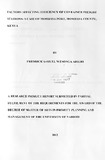| dc.description.abstract | Container Freight Stations (CFS) are sea port facilities which have been touted as important interventions that can mitigate congestion at Mombasa Port. It is therefore germane that CFS must be efficient in the performance of their functions. The aim of this study was to investigate the factors affecting the efficiency of CFS affiliated to Mombasa Port. Specifically, the study aimed at determining whether the type of infrastructure present (such as roads, port, rail, and communication network), the systems used by the CFS to receive and release containers and the machinery/equipment employed by the CFS could influence their efficiency.
The study used a descriptive survey design to collect the pertinent data. The target population consisted of all the 17 managers or responsible officers of the CFS at Mombasa Port. Since the target population was small, the study adopted a census method. in which the entire population was used in the study. Primary data was collected using structured questionnaires while secondary data was collected through the analysis of documents. Quantitative data summarised using descriptive statistics while inferential statistics used to answer the research questions under study.
An Ordinal Linear Regression (OLR) model was used to analyse the relationships between the independent variables (type of infrastructure present, systems used by the CFS to receive and release containers and machinery/equipment employed by the CFS) and the dependent variable (efficiency of CFS). This study is significant because there is scant literature on this subject of CFS efficiency. and studies carried out so far on CFS efficiency have overall been constrained partly by the lack of up-to-date and reliable data (UNCT AD, 1987). ' Second, as nations are becoming more 'global' and their industries more exposed to the pressures of international competition, there is a growing realization that services supplied to their industries must be provided on an internationally competitive basis.
Thus, there is a push amongst port authorities to improve their port efficiency due to increasing competition between ports and growing pressure from shippers for lower port and shipping charges. Needless to say, CFS form a vital link in the overall trading chain and consequently, their level of efficiency and performance determines to a large extent a nation's international competitiveness. However. in order to achieve and maintain a competitive edge in the international markets. a nation needs to understand the underlying factors of CFS efficiency, and continually assess its performance relative to the rest of the world so that appropriate business 'strategies can be devised. It is hoped that the findings from the study will be useful to the CFS and Kenya Ports Authority in designing optimal systems that can provide the most efficient services to their customers in order to increase performance and competition. | en_US |

